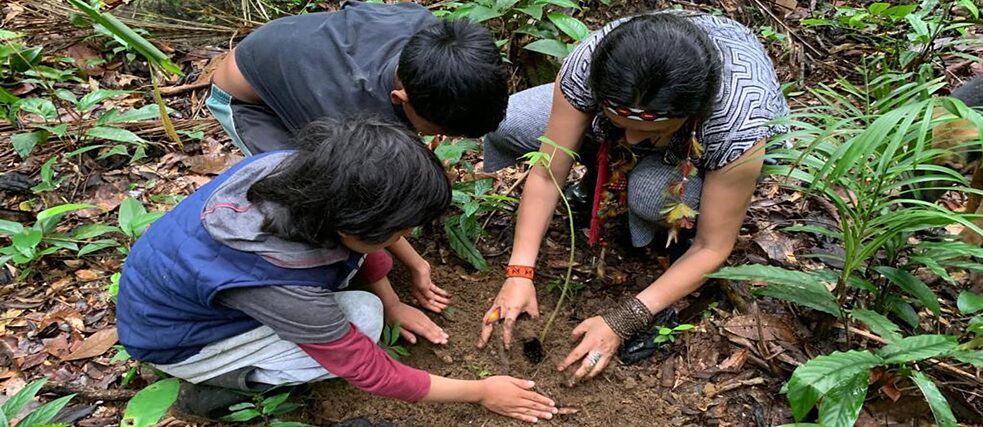Instituto Maracá, São Paulo, Brazil
Preserving the botanical knowledge of the Guarani

Planting activities with the Guarani in Rio Silveira | © Carlos Papá Mirim, Goethe-Institut
The Maracá Institute is an NGO founded in 2017 with the aim of protecting, disseminating and processing the historical, ecological and cultural heritage of indigenous peoples. In video documentaries, the botanical knowledge of the Guarani-Mbya community of the village of Rio Silveira will now be made accessible to the public.
By Adriana Calabi
Maracá Institute is a non-governmental organization established in 2017 by indigenous leaders and non-indigenous professors. The purpose of our work is to protect and spread the historical, environmental, and cultural heritage of indigenous peoples by offering knowledge and information to the Brazilian public We intend to create spaces of intercultural dialogue and thereby help build a more plural, democratic and inclusive society. Therefore the Maracá Institute also carries out social, educational, cultural, environmental, and healthcare-related projects designed to improve living conditions in indigenous communities that invariably involve indigenous representatives and communities.
The coronavirus pandemic and the social distancing measures stemming thereof have severely impacted our activities. Many of our partners were forced to put their activities on hold, compromising our own work plans. Besides the pandemic, the crackdown by authorities on the rights of Brazilian native peoples during the current administration has posed a serious threat to the continuation of our work and projects.
The projects approved by the International Relief Fund in 2020 and 2021 enabled the continuation of the Maracá Institute’s activities: In the Guarani do Rio Silveira Village the construction of a workspace in the village including a meeting area, a plant nursery, an office with internet access, work equipment, and a bathroom was realized and has allowed communication and remote work with our indigenous coworkers, as well as actions designed to strengthen and protect the community.
Especially important were the conversations within the community about traditional Guarani approaches to healthcare, medicinal plants, traditional agricultural practices and diets, traditional construction and housing, and other topics. The start of medicinal plant cultivation activities in the nursery led to the creation of other initiatives involving the cultivation and use of plants traditionally employed by the Guarani for different purposes – as medicine, food, in the crafting of objects, and in homebuilding.
The possibility of continuity afforded by the second open call, in 2021, allowed us to expand our cultivation activities now with support from an agronomist. Footage including testimonials from Guarani wisemen and specialists, digitized during the previous project, is now being organized and cataloged by indigenous agents an archivist and anthropologist. The material provides food for thought, allowing in-depth conversations and reflection with community members regarding cultural heritage, the management of memory, and archive creation and management.
We are motivated to expand our work and support in intercultural exchange, the preservation and transmission of indigenous knowledge and make an important contribution to the recognition of different peoples and cultures and thus to a more pluralistic, diverse world.
Adriana Calabi, born in São Paulo in 1971, holds a degree in Social Sciences from Unicamp. She has worked on developing policies relating to indigenous peoples in the State of São Paulo, especially the Guarani Mbyá. That work involved devising actions and projects to protect indigenous peoples’ rights and to cherish their cultures, with particular emphasis on training and qualification efforts allowing indigenous representatives to perform conscious, well-informed work with agencies tasked with creating and implementing public policies.
More recently, alongside indigenous friends, partners and allies, she created Instituto Maracá, one of the first indigenous-established NGOs in Brazil, in a bid to achieve greater autonomy and independence in developing actions and projects proposed and devised by indigenous representatives themselves.